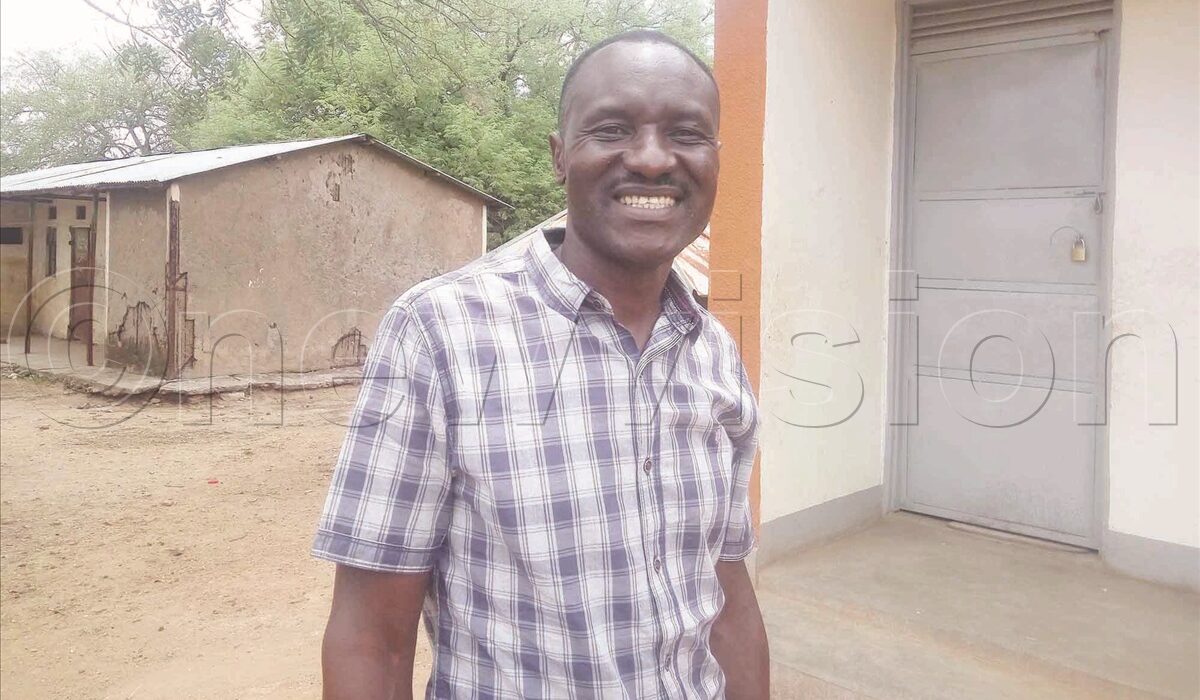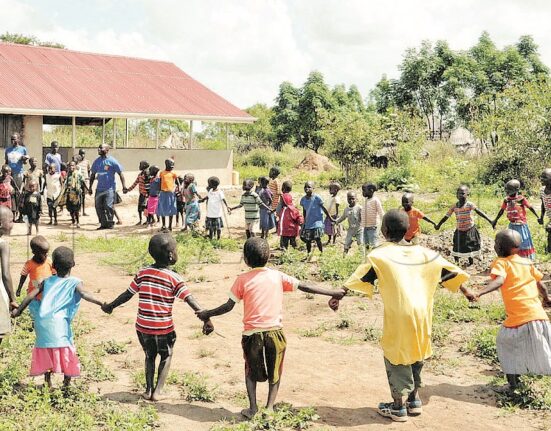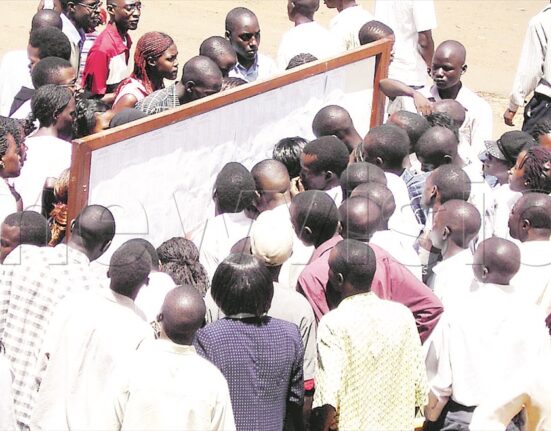This article was first published in the New Vision on April 27, 2022
By Andrew Masinde
Robert Simiu Chemuku is the headteacher of Longalom Primary School in Lonalom village, Lokopo sub-county in Napak district. The 46-year-old was born in Amudat district.
He studied at Ndakaru Primary School, Kyesamisi High School and Moroto Core Primary Teachers College, where he attained his Grade III teaching certificate in 1999.
Building Rainbow PS
He joined St Philip’s Church in Moroto town volunteering with other youth in the community. In the course of his work, he observed that many children were living on the streets, while others were in child-headed families after their parents had been killed by cattle rustlers.
In 2000, Simiu suggested that the church start a feeding centre for vulnerable children, which was granted. The community asked that the centre be turned into a school and donated land, marking the beginning of Rainbow Primary School.
“I traversed the community urging parents to enrol their children in the school. We used to work with staff to bathe, cut the hair and feed the children,” he says.
Simiu was appointed the school’s first headteacher. He lobbied the district to construct permanent structures. They secured funding from the Karamoja projects implementation unit, which covered 70% and the community contributed the rest by providing labour and building materials such as sand. Simiu sought additional support from the sub-county,which was granted for the construction of a three-classroom block and an office block.
In 2003, the district took over the school, making it government-aided. The district constructed staff houses, two classroom blocks and latrines.
Because the community was poor, learners would not go beyond primary school level and Simiu lobbied Full Gospel Church in Moroto to provide full bursaries for learners who excelled to join secondary school.
Posted To Lopei PS
In 2009, Simiu was transferred to Lopei Primary School. It was insecure as cattle rustlers would often raid the school and rape girls. Community members used to seek refuge from at the school, turning it into a refugee camp of sorts.
Simiu reluctantly accepted the transfer and was also appointed as the sub-county chief by the chief administrative officer.
“He is a courageous man who dealt with violent communities who have been pacified. He also requested the First Lady, who was by then minister for Karamoja affairs, to set up a secondary school in the community, which was granted,” Matthew Lochero, the then LC3 chairperson of Lopei sub-county says.
He adds that Simiu also helped the sub-county to increase revenue collection and build the school infrastructure, increasing pupil enrolment.
Simiu says many children were engaged in domestic work, keeping them out of school. He sensitised communities about the need to educate their children and many said they could not afford scholastic materials.
He thus set up a vegetable garden so children could grow vegetables and the proceeds used to buy scholastic materials. The school also started growing maize and sorghum, which was used to feed the learners and their parents.
Isaac Lokop, one of the parents, says Lopei was considered arid, until Simiu proved that it could be used for agriculture.
“Since food was the one keeping children away from school, many returned because they knew there was food. Simiu is a man who is blessed by God and he loves children,” he says.

Managing Security
As a sub-county chief, Simiu requested for a Police post in the sub-county to fight insecurity caused by cattle rustlers who would attack the school, rape girls, vandalise property and kill community members.
“I provided space at the school for a station. My aim was to secure the school and community. Cases of rape in the school stopped,” he says.
Simiu adds that there was a high rate of absenteeism, with boys engaged in labour and girls in early marriages.
To manage this, Simiu started a boarding section, but many parents said they could not afford it. In response, Simiu used the proceeds from vegetable sales to support the children.
“I bought mattresses and bedsheets and the food was available. I ensured all girls were in the boarding section to keep them safe,” he says. Simiu also started a Primary Seven class at the school.
At Kokupoi Primary School
In 2011, Simiu was transferred to Kokupoi Primary School. It had old buildings and was not fenced; making it hard to keep learners in school.
He sought funding from the Northern Uganda Social Action Fund Project (NUSAF2) programme, which was used to construct a fence and teachers’ houses.
Since the school was not providing meals, but had land, Simiu introduced farming. He also wrote to the ISP project, an Italian Non-government Organisation requesting an irrigation system and the school received a solar-powered one.
Transfer To Kangole
In 2014, Simiu was transferred to Kangole Boys’ Primary School as a deputy headteacher. The school was struggling. He lobbied for more teachers, as well as teaching materials.
The pupils were unruly, so he urged parents to counsel their children. He worked with the school administration on reforms to improve discipline. To green the school, Simiu collected trees and flowers from friends, which he planted with the learners.
Learners used to drop out of school due to lack of tuition. Simiu introduced vegetable growing and suggested that children who could not afford school fees work in the gardens and proceeds were converted into tuition fees.
In 2017, Simiu wrote to the ISP project requesting funds to rehabilitate the dormitories, which was granted. The project also provided mattresses and beds.
The school had many learners with hearing impairment and he sought help from the International Institute for Rural Reconstruction. Some of the learners got hearing aids, others were taken for surgery and given goats for livelihood.
The community lacked a kindergarten and Simiu lobbied for one, which was named St Paul’s Nursery School.
He also requested the school management to invest in co-curricular activities. The administration levelled the playground and introduced games. The playground is used by the district for any sports activity.
Sister Laudia Chebet, the headteacher of Kangole Boys, describes Simiu as development-oriented. She says the school is green because of him.
Moved To Longalom
In 2020, Simiu was transferred to Longalom Primary School. Being an urban school with a high population, his focus was on how to improve academics. Simiu says he started with sourcing for teachers and motivating them.
Emason Achilla, the Parent-Teacher Association chairperson, says parents believed the Government had to provide everything, including scholastic materials and uniforms.
“However, the headteacher informed parents that the Government provides the basics, while parents had to handle the rest,” Achilla says.
The school had a four-classroom block that was almost collapsing. Simiu requested the district to renovate it, which they did. The district constructed a dormitory and equipped it with beds, as well as a four-unit teachers’ house, replacing the rundown staff houses. The district also emptied the latrines.
The school also had no water source and Simiu sought water harvesting tanks from the district, which were provided.
To keep girls in school, he sources scholarships for them, introduced making reusable sanitary pads and made the wash rooms user-friendly.
Lucy Keem, the chairperson of the School Management Committe, says Simiu has improved the school’s performance.
“We had never got a first grade, but in the two years he has been here, we have had first grades. He introduced a boarding section for girls. He also set up a brass band for the girls. It is hired by the community so the money is used to support the education of girls,” he says.
COVID-19
During the COVID-19 pandemic, Simiu worked with various NGOs to deliver reading materials to learners. He would organise the learners in groups in the homesteads and teach them.
He also introduced liquid soap making to ensure a steady supply at the school.
Simiu also requested the hospitals in the area to provide reusable pads to the girls in the communities. When the schools opened, girls had all they needed to stay in school.
WHAT OTHERS SAY
JEREMIAH ABURA, Lokopo sub-county chief
Simiu is a hardworking headteacher. Imagine the few years he has been there; he has made remarkable changes.
JOYCE NAKOYA, Napak district education officer
Simiu is committed to his job and always mobilises resources for the school. He is always supporting the girl child to stay in school and also encourages the community to bring the children to school.









Leave feedback about this